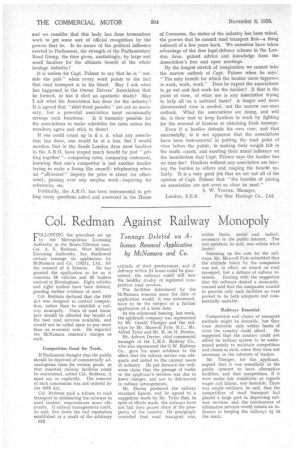Col. Redman Against Railway Monopoly
Page 50

If you've noticed an error in this article please click here to report it so we can fix it.
COLLOWING the precedent set up
by the Metropolitan Licensing Authority in the Bouts-Tillotson case, Col. A. S. Redman, West Midland Licensing Authority, has disallowed certain tonnage on application by McNamara and Co. (1921), Ltd., for
the renewal of A licences. He has granted the application so far as it concerns 29 vehicles and 22 trailers centred at Birmingham. Eight vehicles and eight trailers have been deleted, pending further evidence of need.
Col. Redman declared that the 1933 Act was designed to control competition, rather than -to establish a railway monopoly. Users of road transport should be afforded the benefit of the best road services available, and should not be called upon to pay more than an economic rate. He regarded the McNamara concern's charges as such.
Competition Good for Trade.
If Parliament thought that the public should be deprived of commercially advantageous rates for certain goods, so that essential railway facilities could be maintained, added Col. Redman, it must say so explicitly. The removal of such concessions was not ordered by the 1933 Act.
Col. Redman paid a tribute to road transport in stimulating the railways to meet traders' requirements more efficiently. If railway managements could, he said, live down the bad reputation established as a result of the arbitrary
c12
attitude of their predecessors, and if delivery within 24 hours could be guaranteed, the railways ceuld still face the healthy rivalry of regulated competitive road services.
The facilities introduced by the McNamara concern since the date of application would, it was announced, have to be the subject of a further application at a later date.
At the adjourned hearing, fast week, the applicant company was represented by Mr. Gerald Thesiger and the railways by Mr. Maxwell Fyfe, K.C., Mr. Alfred Tylor and Mr. B. de H. Pereira.
Mr. Ashton Davies, chief commercial manager of the L.M.S. Railway Co., who also represented the G.W. Railway Co., gave his usual evidence to the effect that the railway service was adequate and suited to the current needs of industry. He put forward the wellworn claim that the passage of traffic to the applicant's services was due to lower charges, and not to deficiencies in railway arrangements.
Mr. Davies produced the railway standard figures, and he agreed to a suggestion made by Mr. Tylor that, in spite of efforts made, the railways have not had their proper share of the prosperity of the country. He grudgingly conceded that road transport was, within limits, useful and, indeed, necessary in the public interest. The real question, he said, was within what limits?
Summing up the case for the railways, Mr. Maxwell Fyfe submitted that the attitude taken by the companies was not, in effect, an attack on road transport, but a defence of railway in terests. Dealing with the suggestion that the railways desired a monopoly, counsel said that the companies wanted to provide only such facilities as were proved to be both adequate and commercially suitable.
Railways Essential.
Competition and choice of transport methods might be desirable, but they s were desirable only within limits of what the country could afford. He suggested that the country could not afford its railway system to be undermined merely to maintain competition and choice as such, when they were not necessary in the interests of traders.
Mr. Thesiger, for the applicant, argued that it was essentially in the public interest to have alternative facilities, and that competition, if it were under fair conditions as regards wages and labour, was desirable. There was ample evidence, he said, that the competition of road transport had played a large part in improving railway services, and the continuance of alternative services would remain an influence in keeping the railways up to the mark.












































































































